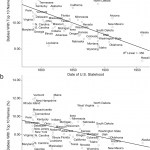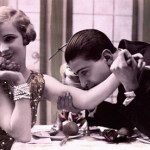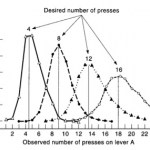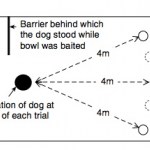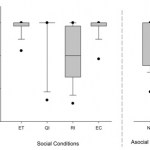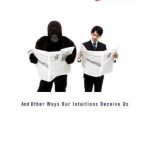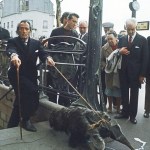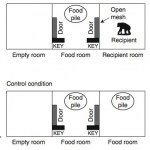My latest piece for LAist just went up:
Retail therapy: It's the answer for almost any problem. Girlfriend broke up with you? Didn't get that promotion? Buy yourself something pretty. People like to shop, especially for high-status items, when they're feeling down. Decades of research has indicated that when a key feature of one's identity is threatened - such as by being passed over for a promotion or being dumped by a former lover - people turn to things. Possessions can allow us to signal our awesomeness to others. And if others think we're awesome, then we just might begin to remember…
decision-making
PsychBytes is an experiment: three recent findings in psychology, each explained in three paragraphs or less. Generally, these are papers that I wouldn't have otherwise covered in this blog. Please share your thoughts on this model in the comments. What works, and what doesn't? Would you like more PsychBytes in the future?
What's In A Name?
People who settle down and build a life in the frontier tend to be more individualistic, even if they started out with more interdependent values. Some features of the frontier life that would be attractive to an independent person are low population…
Painstaking scientific research has identified seven dating tips that could boost your chances on Valentine's Day ... including shouting in his right ear and scaring him witless.
Whether or not you have a Valentine this year, head on over to check out to my latest piece in The Guardian: Valentine's Day dating tips from lovestruck scientists.
Photo: Getty Images/Brand X
"When men wish to construct or support a theory, how they torture facts into their service!"
Even in 1852, psychologists like Charles Mackay, who wrote those words in his book Extraordinary Popular Delusions and the Madness of Crowds, were well aware of the dangers of confirmation bias.
I was reminded of the pervasiveness of this cognitive bias last weekend during a visit to GlaxoSmithKline's vaccine distribution facility in Marietta, Pennsylvania. Confirmation bias is as dangerous in 2010 as it was in 1852.
I was invited by David Wescott to join a group of bloggers for an event at GSK's…
Does Fido see the cup as half full? Is your dog pessimistic? Last time we saw headlines like these they were about a certain barnyard animal. Remember "Pampered pigs 'feel optimistic'"? I didn't like it then, and I don't like it now.
Roughly half of the population of dogs in the UK are likely to - at some point in their lives - exhibit "undesirable separation-related behavior (SRB)." These are things that sometimes happen when left alone, like barking, chewing up or otherwise destroying objects, and urinating (or worse!) inside the house. While some owners view these behaviors as fine and…
Cooperation and conflict are both a part of human society. While a good deal of the academic literature addresses the evolutionary origins of conflict, in recent years there has been an increased focus on the investigation of the evolutionary origins of cooperative behavior. One component of cooperative behavior that might be present in other animals is aversion to inequity. Some scientists have suggested that inequity aversion may itself be the main factor driving the enforcement of cooperation. Put simply, inequity aversion is the resistance among partners to unequal rewards following…
Quandaries such as those involving stealing a drug to save a spouse's life or whether or not to have an abortion have historically dominated the study of the development of moral thinking. The predominant research programs in psychology today use dilemmas in which one choice is deontologically correct (it is wrong to rotate a lever that will divert a train and kill one person instead of five), and the other is consequentially correct (kill one person if it will save five others).
It is not surprising that psychologists have followed philosophers in proposing definitions for morality that…
If there is one book that every human should read, it is The Invisible Gorilla, by Chris Chabris and Dan Simons.
I suppose that's a pretty bold statement to make. Let me explain. As a student of psychology, and as someone who studies and writes about the mind, I am overwhelmed with the general perception among the lay public that "social science findings often reaffirm or echo what common sense observations tell us." But the truth is that common sense observations often lead us astray. We have very little insight into the way our minds actually operate. And the thing is, this is likely a…
Late last week you might have seen headlines that went something like this:
"Pampered pigs 'feel optimistic'"
or, this: "Can you ask a pig if his glass is half full?"
or, "Pigs have feelings, too (and they prefer a bit of luxury)"
The headlines came, respectively, from BBC News, EurekAlert, and the Daily Mail.
This sounded pretty fishy to me. Optimism or pessimism requires a certain amount of introspection and future awareness. Without a meaningful sense of the future, optimism doesn't mean very much. I don't know much about cognition in pigs (and, for that matter, there hasn't been a ton of…
"But wait," you say. "Anteaters aren't pets!" Well, I didn't think so either. But Salvador Dali had a pet anteater. And that's good enough for me.
Figure 1: Salvador Dali taking his pet anteater for a stroll. (Source)
The Giant Anteater, Myrmecophaga tridactyla, only eats ants and termites, making it a myrmecophage. (Hey, Alex Wild, now I get what Myrmecos means!) In 1984, a researcher named Kent Redford was interested in the foraging behaviors of the giant anteater, and the relationship between these anteaters and their prey, colonies of highly social insects. So Redford went to Brazil to…
Bonobo Week continues! I'm donating whatever proceeds I receive from my blogging shenanigans for the entire month of June to help the bonobos at Lola Ya Bonobo.
Imagine that you're wandering in the desert and you come across two magic lamps. One lamp grants three wishes. It's your standard sort of magic lamp with a genie in it. (No wishing for extra wishes, of course.) The second magic lamp is, well, a moody magic lamp. It's inconsistent. Sometimes it grants one wish, and sometimes it grants seven wishes. But the thing is, you don't know for sure whether, when you rub the lamp and genie pops…
Bonobo Week continues! I'm donating whatever proceeds I receive from my blogging shenanigans for the entire month of June to help the bonobos at Lola Ya Bonobo.
Primate researchers used to think that only humans voluntarily share their own food with others. At the time, it was a reasonable conclusion to make, since lots of studies indicated that chimps don't. But that was before anyone checked to see if bonobos were willing to share their food with others.
So Brian Hare and Suzy Kwetuenda tested pairs of the bonobos from the Lola Ya Bonobo sanctuary in DRC. In all cases, the two…
Some kids more readily recognize Ronald McDonald than the President of the United States of America. Sad, right?
Check out this exchange, from the 2004 movie Super Size Me:
Morgan Spurlock: [to kids] I'm gonna show you some pictures and I want you to tell me who they are.
Children: OK.
Morgan Spurlock: [Showing a picture of George Washington] Who's that?
Child: George Washington?
Morgan Spurlock: Good. Who was he?
Children: He was the 4th president. He freed the slaves. He could never tell a lie.
Morgan Spurlock: [Shows picture that you can't see] Who's that?
Child: George W. Bush?
Morgan…
It's amazing how much you can learn about an animal's mind by a simply watching it.
Video 1: Gratuitous video of octopuses never hurt anyone. Maybe this will sate the Pharyngulites.
In the late 1980s, a researcher named Jennifer A. Mather wondered about octopuses' use of spatial memory. This researcher and some volunteers did some skin-diving near Bermuda and observed octopuses going out in search of food. They noticed that sometimes after catching a tasty bit of chow, the octopuses ate out, but sometimes they'd take their snack to go and eat at home. And not only that, but it turned out…
We like to be in control of our own lives, and some of us have an automatic rebellious streak when we're told what to do. We're less likely to do a task if we're ordered to do it than if we make the choice of our own volition. It seems that this effect is so strong that it even happens when the people giving the orders are... us.
In a set of three experiments, Ibrahim Senay from the University of Illinois has shown that people do better at a simple task if ask themselves whether they'll do it than if they simply tell themselves to do so. Even a simple reversal of words - "Will I" compared…
We spend a lot of time wondering about what other people think of us. Do they find us attractive, intelligent, capable or trustworthy? Considering how often we mull over such questions and how confidently we arrive at conclusions, we are remarkably bad at answering them. We have a nasty tendency to use our own minds as a starting point when reasoning about other people's and we rely too heavily on stereotypes and other expectations. In short, we are rubbish telepaths.
Mind-reading is still the stuff of science-fiction (or quackery) but Nicholas Epley is more interested in the everyday…
Some people go out of their way to help their peers, while others are more selfish. Some lend their trust easily, while others are more suspicious and distrustful. Some dive headlong into risky ventures; others shun risk like visiting in-laws. There's every reason to believe that these differences in behaviour have biological roots, and some studies have suggested that they are influenced by sex hormones, like testosterone and oestrogen.
It's an intriguing idea, not least because men and women have very different levels of these hormones. Could that explain differences in behaviour between…
Animals have distinct personalities and temperaments, but why would evolution favour these over more flexible and adaptible mindsets? New game theory models show that animal personalities are a natural progression from the choices they make over how to live and reproduce.
Any pet owner, wildlife photographer or zookeeper will tell you that animals have distinct personalities. Some are aggressive, others are docile; some are bold, others are timid.
In some circles, ascribing personalities to animals is still a cardinal sin of biology and warrants being branded with a scarlet A (for…
"How We Decide" author Jonah Lehrer, fresh from a book tour of the UK, offers what he calls a "spluttering answer" (it's really quite lucid) to a question he says he's getting a lot these days: What decision-making errors were involved in our current financial meltdown??
The short version of his answer -- well worth reading in its entirety -- is that we (and big investment outfits particularlyl) succumbed to an abhorrence of uncertainty.
We hate not knowing, and this often leads us to neglect relevant information that might undermine the certainty of our conclusions. I think some of the…
During elections, what affects our decision to vote for one politician over another? We'd like to think that it's an objective assessment of many different factors including their various policies, their values, their record and so on. But in reality, voters are just not that rational.
In the past, studies have shown that people can predict which of two politicians will win an election with reasonable accuracy based on a second-long looks at their faces. With a fleeting glance and little purposeful consideration, people make strong judgments about a candidate's competence, that can sway…
